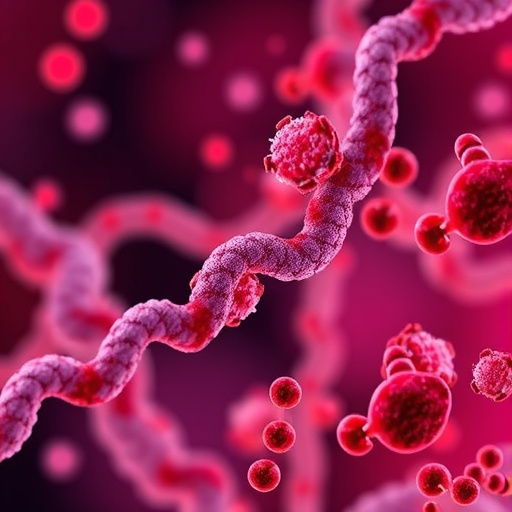In a groundbreaking discovery that could reshape our understanding of cancer biology and therapeutic interventions, scientists have unveiled the multifaceted role of melatonin—a hormone traditionally associated with regulating sleep cycles—in impeding cancer cell proliferation, disrupting DNA repair mechanisms, and downregulating a critical oncogene known as TRIP13. This revelation opens promising avenues in oncology, positioning melatonin as a potent anti-cancer agent with the capacity to undermine tumor growth and resilience at a molecular level.
Melatonin is predominantly secreted by the pineal gland and is well-known for its role in circadian rhythm modulation. However, its emerging role as an anti-cancer compound has sparked considerable interest. The latest work dissects the intricate biochemical cascades through which melatonin exerts suppressive effects on malignant cells. Notably, the researchers have pinpointed melatonin’s interference with DNA repair pathways—a mechanism crucial for maintaining genomic stability and preventing oncogenic mutations—from allowing cancer cells to rectify lethal damage caused by therapeutic agents or intrinsic cellular stress.
Central to this study is the oncogene TRIP13, a gene implicated in various cancer types for its role in chromosomal stability and DNA repair fidelity. TRIP13 facilitates the correction of DNA double-strand breaks, thereby promoting tumor cell survival even under genotoxic stress. The research highlights how melatonin dramatically diminishes TRIP13 expression, leading to heightened vulnerability of tumor cells to DNA damage and impaired proliferative capacity. These effects were consistently observed across multiple cancer cell lines, suggesting a universal mechanism with broad therapeutic potential.
Furthermore, the molecular investigations delve into pathways linking melatonin signaling to the downregulation of TRIP13. The hormone influences key transcriptional regulatory elements and chromatin remodelers, altering the gene expression landscape in favor of tumor suppression. This nuanced control over oncogenic pathways presents melatonin not merely as a passive molecule but as an active modulator of cancer cell fate, capable of tipping the balance away from malignancy.
Importantly, the impairment of DNA repair by melatonin holds transformative implications in the context of existing cancer therapies such as chemotherapy and radiotherapy, both of which rely on inducing DNA damage to eradicate tumor cells. Melatonin’s capacity to inhibit repair proteins synergizes with these treatments, potentially enhancing their efficacy and overcoming resistance mechanisms that often undermine long-term success in cancer management.
The researchers employed a combination of molecular biology assays, gene expression analyses, and cellular proliferation studies to validate their findings. Notably, they observed a significant reduction in cell division rates following melatonin treatment, correlated with decreased TRIP13 levels and accumulation of unrepaired DNA lesions. These data illuminate melatonin’s dual assault on the cancer cell’s ability to reproduce and repair genomic insults.
Another intriguing aspect is the specificity of melatonin’s effects on cancer cells versus normal cells. Preliminary analyses suggest that while melatonin robustly targets malignant pathways, it minimally disrupts DNA repair in healthy cells, thereby offering a therapeutic window that spares normal tissue and reduces adverse side effects—a perennial challenge in oncology.
In vivo studies further consolidate the therapeutic promise of melatonin. Animal models bearing human tumor xenografts demonstrated marked tumor shrinkage and delayed progression post melatonin administration. These findings corroborate the in vitro data and underscore melatonin’s potential as an adjuvant in combinatorial cancer therapy regimens.
The study also calls attention to the broader biological implications of TRIP13 as a nodal point in cancer cell survival mechanisms. Downregulating TRIP13 represents a strategic target, and melatonin emerges as a naturally occurring molecule capable of effecting this suppression through endogenous pathways—a remarkable confluence of physiology and pathology.
On the translational front, these findings pave the way for clinical investigations into melatonin analogs or melatonin-based adjuvant therapies. The prospect of harnessing a well-tolerated hormone to complement current anti-cancer strategies could revolutionize treatment landscapes, particularly where resistance to chemotherapy and radiotherapy poses pronounced challenges.
It is crucial, however, to consider potential caveats and future lines of inquiry. Determining the dosage thresholds that optimize anti-cancer effects without disrupting physiological functions, understanding differential responses across various cancer subtypes, and unraveling the complete molecular interactome influenced by melatonin will be vital in translating this discovery into clinical practice.
Moreover, this research contributes to the growing appreciation of circadian biology’s impact on disease processes, supporting hypotheses that disruptions in melatonin rhythms may subtly predispose to cancer development or progression. Restoring or modulating melatonin levels might thus serve both preventative and therapeutic roles.
The implications of this study resonate beyond oncology, suggesting that melatonin’s influence on fundamental cellular mechanisms warrants broader investigation in other diseases characterized by aberrant cell proliferation and genomic instability. As a widely available and minimally toxic molecule, melatonin’s repositioning as a therapeutic agent could have far-reaching benefits.
In summary, this pioneering study elucidates how melatonin undermines cancer cell viability by suppressing proliferation, hampering DNA repair, and attenuating oncogene TRIP13 expression. The molecular insights gained enrich our understanding of tumor biology and present a compelling case for integrating melatonin-based strategies into comprehensive cancer treatment paradigms. Future research and clinical trials arising from these findings hold promise for more effective, targeted, and less toxic cancer therapies, potentially altering the prognosis for millions worldwide.
Subject of Research: Melatonin’s role in cancer cell proliferation, DNA repair inhibition, and regulation of the oncogene TRIP13.
Article Title: Melatonin suppresses cancer cell proliferation, DNA repair and expression of the oncogene TRIP13.
Article References:
Liu, W., van Pelt, A.M.M. & Hamer, G. Melatonin suppresses cancer cell proliferation, DNA repair and expression of the oncogene TRIP13. Cell Death Discov. 11, 489 (2025). https://doi.org/10.1038/s41420-025-02788-z
Image Credits: AI Generated
DOI: https://doi.org/10.1038/s41420-025-02788-z
Tags: anti-cancer properties of melatoninbiochemical pathways of melatonincancer cell proliferation inhibitioncircadian rhythm and cancergenomic stability and cancermelatonin and cancer treatmentmelatonin as a natural anti-cancer agentmelatonin effects on DNA repairmelatonin role in oncologytherapeutic interventions for cancerTRIP13 oncogene inhibitiontumor growth suppression mechanisms





